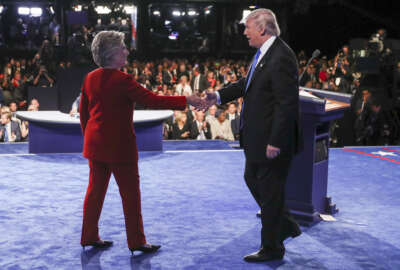
What Donald Trump’s presidency could mean for the federal workforce
Donald Trump claimed his place Wednesday as America’s 45th president, an astonishing victory for the celebrity businessman and political novice, having scored a...
Donald Trump claimed his place Wednesday as America’s 45th president, an astonishing victory for the celebrity businessman and political novice, having scored a stunning victory backed by extraordinary support from working-class America.
Democratic candidate Hillary Clinton called her Republican rival to concede but did not plan to speak publicly until later Wednesday. The Associated Press has yet finalized the results for all 538 electoral votes, but Trump has already surpassed the 270 electoral votes necessary to claim victory.
So what does a Trump presidency mean for the federal workforce?
Trump signals hiring freeze for feds, tacit on benefits
Prior to Election Day, Trump’s campaign did not respond to a questionnaire from the National Active and Retired Federal Employees Association, which asked for his position on federal benefits.
In September, Trump said he would seek out proposals to eliminate government waste and improper payments, and also suggested a hiring freeze for federal employees.
“We can also reduce the size of the federal bureaucracy through responsible workforce attrition — that is, when employees retire, they can be replaced by a smaller number of new employees,” Trump said.
On Oct. 17, Trump released a 5-point ethics reform plan, which includes a 5-year lobbying ban on all executive branch employees after they leave federal service.
In July, Reuters reported on Trump transition team director and New Jersey Gov. Chris Christie telling a group of donors during a closed-door meeting, that the Republican candidate was drawing up a list of people to fire if he is elected.
Trump calls for more robust defense spending as automatic cuts loom
After being sworn in on Jan. 20, 2017, Trump will almost immediately confront the realities of the Budget Control Act, the 2011 law that’s dominated Defense budgeting since the first sequestration cuts took effect in 2013. Those caps will remain in effect through at least the next president’s first term unless he or she can find a long-term political compromise that’s eluded the Obama administration and congressional defense hawks for the past five years.
Trump has advocated for a much larger military along with the elimination of the BCA caps. During a September national security address in Philadelphia, he said his administration would include an Army of 540,000 active duty soldiers — 90,000 more than planned in the latest Obama budget — and a Marine Corps of 36 battalions, a dozen more than planned under the current drawdown from Iraq-Afghanistan war levels. The Trump defense plan also calls for a 350-ship Navy, 50 more than that service’s current shipbuilding goal, and an Air Force of 1,200 fighter aircraft.
The figures borrow heavily from recommendations in the Heritage Foundation’s annual Index of U.S. Military Strength, which argued that the U.S. needs to return to its historical policy of being able to fight two wars simultaneously.
A call for unity
During his acceptance speech, Trump urged Americans to “come together as one united people” after a deeply divisive campaign.
His triumph over Clinton, not declared until well after midnight, will end eight years of Democratic dominance of the White House and threatens to undo major achievements of President Barack Obama. Trump has pledged to act quickly to repeal Obama’s landmark health care law, revoke America’s nuclear agreement with Iran and rewrite important trade deals with other countries, particularly Mexico and Canada.
White House Press Secretary Josh Earnest said in a statement that President Barack Obama reached out to both presidential candidates early Wednesday morning.
“From the White House residence, the President phoned Donald Trump to congratulate him on his victory early this morning. The President also called Secretary Clinton and expressed admiration for the strong campaign she waged throughout the country,” Earnest said.
Earnest said Obama has invited President-elect Trump to the White House on Thursday to discuss transition planning.
“Ensuring a smooth transition of power is one of the top priorities the President identified at the beginning of the year and a meeting with the President-elect is the next step,” Earnest said.
Survey: How will a Trump administration affect the federal workforce?
Federal News Radio wants to know what you think about your future and the impact of the election on your agency and your mission.
Please take our anonymous survey. We will share the results later this week.
Create your own user feedback survey
The Associated Press contributed to this report
Copyright © 2025 Federal News Network. All rights reserved. This website is not intended for users located within the European Economic Area.
Jory Heckman is a reporter at Federal News Network covering U.S. Postal Service, IRS, big data and technology issues.
Follow @jheckmanWFED




